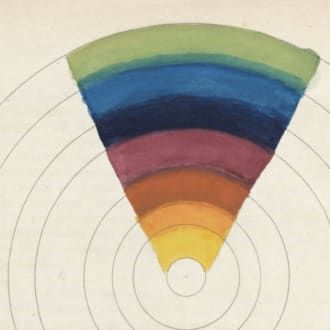The Best of Open Culture
10+ most popular Open Culture articles, as voted by our community.
Open Culture on Art
The Woman Who Theorized Color: An Introduction to Mary Gartside’s New Theory of Colours (1808)
Shared by 1222, including Marcos, Jennifer Ouellette, Tamsen Webster, Message Strategist (she/her), Gabriele
The Louvre’s Entire Collection Goes Online: View and Download 480,00 Works of Art
If you go to Paris, many will advise you, you must go to the Louvre; but then, if you go to Paris, as nearly as many will advise you, you must not go to the Louvre.
«“For the first time ever,” says last week’s press release, “the entire Louvre collection is available online,»
Open Culture on Asimov
Isaac Asimov’s Guide to the Bible: A Witty, Erudite Atheist’s Guide to the World’s Most Famous Book
Painting of Asimov on his throne by Rowena Morill, via Wikimedia Commons Everyone should read the Bible, and—I’d argue—should read it with a sharply critical eye and the guidance of reputable critics…
Isaac Asimov Predicts the Future on The David Letterman Show (1980)
Given this intimidating biography, and the fact that Asimov believed that “hardly anyone can read” in the U.S., we might expect the science fiction legend wanted nothing to do with television. We…
Open Culture on Existentialism
Self-Encounter: The 10-Episode TV Show That Introduced Existentialism to Americans in 1961
Hazel Barnes by way of opening the television series Self-Encounter: A Study in Existentialism. 'As a mood, I think we could say that it is the mood of the twentieth century — or, at least, of those…
Simone de Beauvoir Defends Existentialism & Her Feminist Masterpiece, The Second Sex, in Rare 1959 TV Interview
Given how many academic philosophy departments have banished Existentialism into some primitive wilderness, it seems striking to hear people talk about it as a current phenomenon with a serious,…
Open Culture on Literature
The Favorite Literary Work of Every Country Visualized on a World Map
Begun by user "BackForward24" and crowdsourced through Reddit, this map of the world illustrates the most beloved/popular book of each country by pasting a scan of the book cover over its space on the…
Open Culture on Mooc
1,300 Free Online Courses from Top Universities
Download 1,300 free courses from Stanford, Yale, MIT, Harvard, Berkeley and other great universities to your computer or mobile device. Over 45,000 hours of free audio & video lectures.
Open Culture on Quantum Computing
The Animated Map of Quantum Computing: A Visual Introduction to the Future of Computing
If you listen to the hype surrounding quantum computing, you might think the near future shown in Alex Garland's sci-fi series Devs is upon us -- that we have computers complex enough to recreate time…
Open Culture on Science Fiction
The First Work of Science Fiction: Read Lucian’s 2nd-Century Space Travelogue A True Story
Late in life, Kingsley Amis declared that he would henceforth read only novels opening with the sentence 'A shot rang out.' On one level, this would have sounded bizarre coming from one of Britain's…
The Encyclopedia of Science Fiction: 17,500 Entries on All Things Sci-Fi Are Now Free Online
What turns people into science-fiction fans? Many enter through the gateway of Star Trek, an early 1960s television series 'set on the worlds visited by a giant Spaceship, the U.S.S. Enterprise, and on the ship itself.
Open Culture on Writing
Artificial Intelligence Identifies the Six Main Arcs in Storytelling: Welcome to the Brave New World of Literary…
Is the singularity upon us? AI seems poised to replace everyone, even artists whose work can seem like an inviolably human industry. Or maybe not.
Umberto Eco’s 36 Rules for Writing Well (in English or Italian)
Creative Commons image by Rob Bogaerts, via the National Archives in Holland Umberto Eco knew a great many things. Indeed too many things, at least according to his critics:
«Hold those quotes. Emerson aptly said, “I hate quotes. Tell me only what you know.”»
Popular
These are some all-time favorites with Refind users.
What Happens When Artificial Intelligence Creates Images to Match the Lyrics of Iconic Songs: David Bowie’s “Starman,”…
Lyricists must write concretely enough to be evocative, yet vaguely enough to allow each listener his personal interpretation.
Is Coffee Good for You?: A Coffee Connoisseur Reviews the Scientific Research
According to NPR, 'Caffeine is the most widely consumed drug in the world. Here in the U.S., according to a 2022 survey, more than 93% of adults consume caffeine, and of those, 75% consume caffeine at…
Enter an Archive of 7,000 Historical Children’s Books, All Digitized & Free to Read Online
We can learn much about how a historical period viewed the abilities of its children by studying its children's literature.
There Are Only 37 Possible Stories, According to This 1919 Manual for Screenwriters
Shared by 123, including luis antónio santos, Casey Smith, erik spiekermann, APKYP, Andrew Ermogenous
60 Free Film Noir Movies Open Culture
Watch 50 great Noir films directed by Orson Welles, Billy Wilder, Fritz Lang, and starring Humphrey Bogart, Barbara Stanwyck and Edward G. Robinson. All free.
What is Refind?
Every day Refind picks the most relevant links from around the web for you. is one of more than 10k sources we monitor.
How does Refind curate?
It’s a mix of human and algorithmic curation, following a number of steps:
- We monitor 10k+ sources and 1k+ thought leaders on hundreds of topics—publications, blogs, news sites, newsletters, Substack, Medium, Twitter, etc.
- In addition, our users save links from around the web using our Save buttons and our extensions.
- Our algorithm processes 100k+ new links every day and uses external signals to find the most relevant ones, focusing on timeless pieces.
- Our community of active users gets the most relevant links every day, tailored to their interests. They provide feedback via implicit and explicit signals: open, read, listen, share, mark as read, read later, «More/less like this», etc.
- Our algorithm uses these internal signals to refine the selection.
- In addition, we have expert curators who manually curate niche topics.
The result: lists of the best and most useful articles on hundreds of topics.
How does Refind detect «timeless» pieces?
We focus on pieces with long shelf-lives—not news. We determine «timelessness» via a number of metrics, for example, the consumption pattern of links over time.
How many sources does Refind monitor?
We monitor 10k+ content sources on hundreds of topics—publications, blogs, news sites, newsletters, Substack, Medium, Twitter, etc.
Can I submit a link?
Indirectly, by using Refind and saving links from outside (e.g., via our extensions).
How can I report a problem?
When you’re logged-in, you can flag any link via the «More» (...) menu. You can also report problems via email to hello@refind.com
Who uses Refind?
450k+ smart people start their day with Refind. To learn something new. To get inspired. To move forward. Our apps have a 4.9/5 rating.
Is Refind free?
Yes, it’s free!
How can I sign up?
Head over to our homepage and sign up by email or with your Twitter or Google account.

















